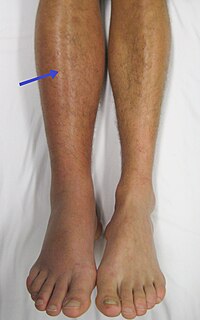
Photo from wikipedia
ABSTRACT Background: A previous meta-analysis demonstrated that 3 of the new-generation BCR-ABL tyrosine kinase inhibitors (TKIs) (dasatinib, nilotinib and ponatinib) are associated with an increased risk of vascular occlusive events… Click to show full abstract
ABSTRACT Background: A previous meta-analysis demonstrated that 3 of the new-generation BCR-ABL tyrosine kinase inhibitors (TKIs) (dasatinib, nilotinib and ponatinib) are associated with an increased risk of vascular occlusive events in patients with Ph+ chronic myeloid leukemia compared with imatinib. This meta-analysis of randomized controlled trials aims at assessing these risks separately. Methods: The literature search was performed by two independent reviewers following the previous protocol (PROSPERO 2014:CRD42014014147). A random-effects model and a fixed-effect model were used according to the characteristics of the included studies. Peto odds ratios with 95%CI were computed. Results: Overall, 4.78% of patients developed arterial occlusive events with new generation TKIs compared with 0.96% with imatinib. Ponatinib (ORPETO:3.26; 95%CI:1.12 to 9.50), nilotinib (ORPETO: 3.69; 95%CI:2.29 to 5.95) and dasatinib (ORPETO:3.32; 95%CI:1.37 to 8.01) are all associated with a higher risk of arterial occlusive events than imatinib. Venous occlusive events occur in 0.72% of patients treated with new generation TKIs and in 0.27% of imatinib-treated patients. Overall, a trend toward an increase of the rate of venous occlusive events with new-generation TKIs (ORPETO:2.17; 95%CI:0.90 to 5.25) was highlighted but stratifications by treatment gave nonsignificant results. Conclusions: Vascular occlusive events associated with new-generation BCR-ABL TKIs are driven by arterial occlusive events.
Journal Title: Expert Opinion on Drug Safety
Year Published: 2017
Link to full text (if available)
Share on Social Media: Sign Up to like & get
recommendations!